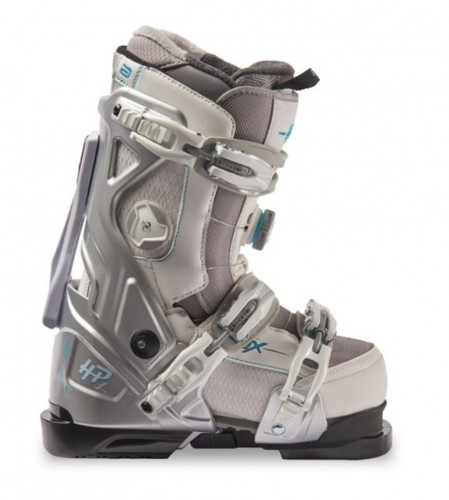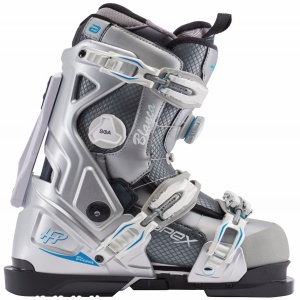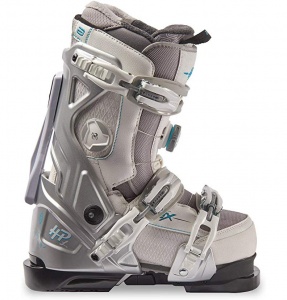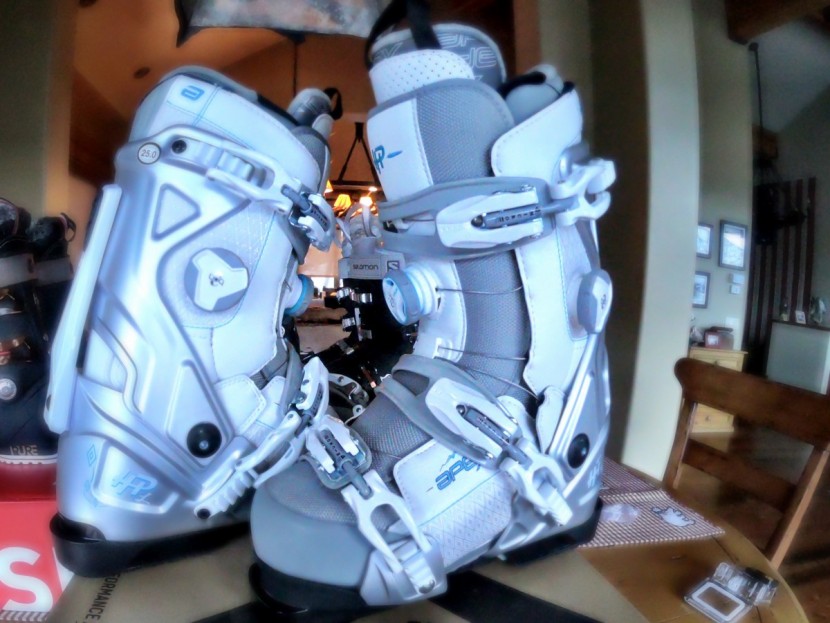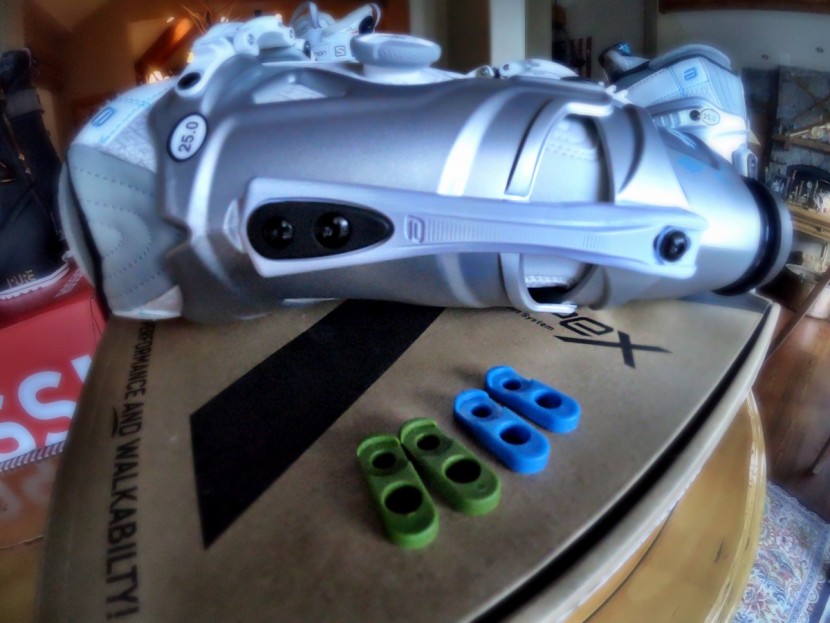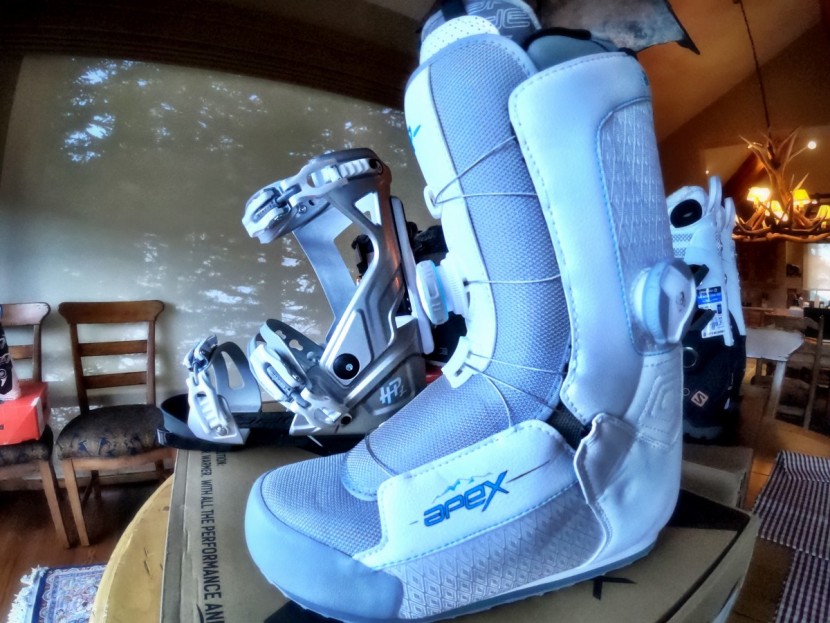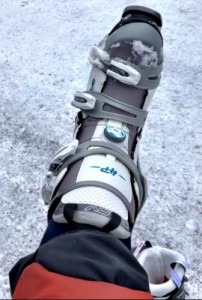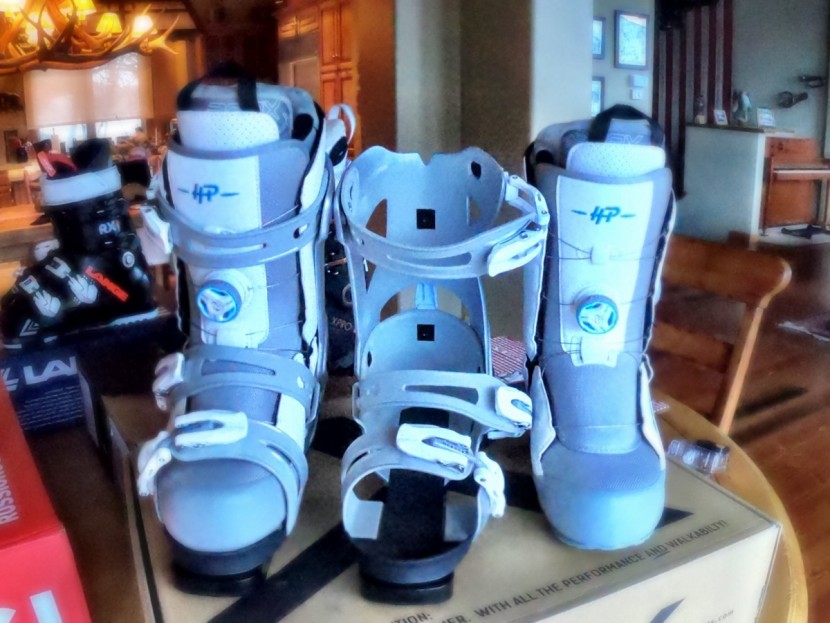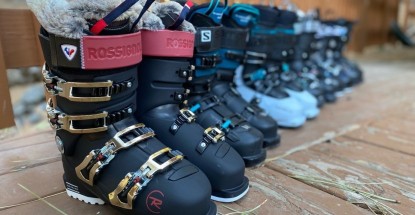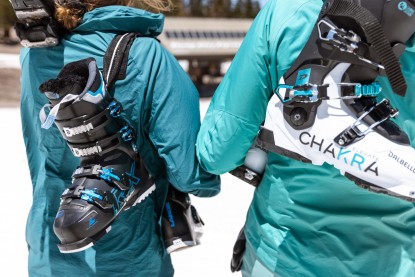Apex changed this boot up a bit and gave it the new moniker of Blanca. See the details and comparison photos below.
January 2020Apex HP-L Women's Review
Our Verdict
Our Analysis and Test Results
New Blanca Boot vs. the HP-L
Since our test period, Apex updated the HP-L boot and renamed it the Blanca. The new boot has Semi-Serpentine lacing on the top portion, designed to secure the boot tighter around the lower leg. The changes appear to be subtle. Compare the two versions below; the Blanca is pictured first, followed up by the HP-L version we tested.
We're now linking to the more readily available Blanca, but since we haven't actually tested that exact model, the review text below refers only to the boot we tested, the HP-L.
Hands-On Review of the HP-L
Innovation doesn't always translate to function. Thinking outside the box is the only way to keep pushing forward and breaking the monotony of what's considered standard. We felt a little like “Bambi on ice” in this new design… let us tell you why.
Performance
We found this boot very difficult to ski even at low speeds, making very round skidded turns. Even our most expert tester and former racers could not make a carved turn wearing this boot. We had the expert skier mechanism installed into the proprietary Apex Flex Arm, which is meant to act as the stiffening leverage arm that runs up the back of the boot.
And still, the boot collapsed so quickly our quads were screaming for rest. The leverage of a traditional four buckle boot with a power strap lets you rest at the top of the turn. This happens when you stack your body and use gravity and the boot to hold you up before you start steering the skis again. We found this nearly impossible to accomplish in the HP-L because the soft boot and flimsy exoskeleton straps on the exoskeleton are not stiff enough to hold an adult body up. We even found skating to the chairlift quite tricky.
Comfort and Fit
Since a snowboard boot is significantly more comfortable than traditional ski boots, we expected huge gains in comfort. But we did not find the HP-L to be any more or less comfortable than a traditional alpine boot. In fact, we felt the fit to be less comfortable than most others tested since they provide so little support. This boot could be an option for somebody who lacks ankle mobility and finds it difficult to get into a traditional plastic ski boot.
Because the soft inner boot is removable from the hard shell exoskeleton, the sole length is significantly longer than that of a traditional boot. Consequently, you will probably have to remount your bindings to your skis to fit the extra length. The concept is brilliant, and the exoskeleton is easy to take off, but then the question begs, "what do you do with it"?
This boot fits small. If you usually wear a 25 on the mondo chart, you will need to size one full size up. We had this boot heat molded by an Apex trained technician, and the fit was significantly better after having the liner baked and formed to the foot. We suggest trying a demo or at least ordering two sizes if you are unsure.
Features
If there's one category the Apex isn't lacking in, it's in features! The BOA system allows you to adjust the entire boot to your foot and shin using two dials, ensuring an equally snug fit everywhere. Even before we heat molded the liner, the soft inner boot feels like a custom fit after using the BOA technology. The moldable liner is just icing on the cake when you're talking about getting that custom feel from toes to calves.
The exoskeleton is completely removable, and it's meant to be shed when you want to walk around without feeling the familiar heel, toe clunk of the ski boot walk. The toe and heel pieces on the exoskeleton have minimal traction, in all likelihood because you're meant to walk in the soft boot only.
This boot is often advertised in the intermediate category, but the Apex website claims that this boot is appropriate for all abilities, presumably, because each boot comes with an insert for beginners, intermediate, or expert skiers. We do not agree. It's not a great boot for any ability level.
Durability
This one is tough for us because the boot is entirely different from any other ski boot tested. It's also unlike anything we've experienced before. We do worry that the flimsy plastic straps could break or wear out faster than the more supported plastic of a traditional ski boot. There are so many moving parts and pieces to break that the longevity of each component is legitimate.
Warmth
We tested the HP-L in sub-zero and sunny, above freezing conditions. Our feet were comfortable in both scenarios, similar to a traditional, un-heated ski boot.
Finding the right fit goes a long way. If you suffer chronically cold feet, consider a heated boot in the same price range. You can pick up a boot with an integrated heating system like the Rossignol Pure Pro Heat.
Best Applications
The only realistic application we see for this boot is for someone who can not wear a traditional ski boot for whatever reason. Because the BOA system allows for easier entry, this could be a good design for someone who can't get into a normal ski boot.
Value
The HPL has a no joke price tag. As far as ski boots go, this is one of the more expensive options. When you consider its poor performance, it also offers poor value. You'll also need to have your bindings re-tested and reset to accommodate the boots' much longer sole if you're using skis you already own.
Conclusion
We like that Apex is thinking outside the box, and are excited that new technology is making its way into a sport that carries so much passion for so many people. Unfortunately, this boot falls short.
Other Versions and Accessories
Apex advertises a stiffer option called the Apex XP-L with a 95-115 flex rating for $800. This model includes the same bells and whistles as the Apex HP-L tested here.


